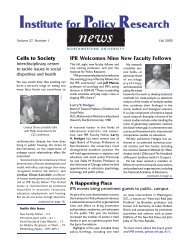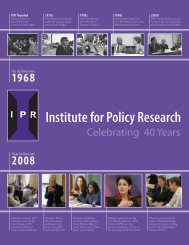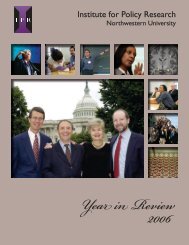Highlights of 2011 - Institute for Policy Research - Northwestern ...
Highlights of 2011 - Institute for Policy Research - Northwestern ...
Highlights of 2011 - Institute for Policy Research - Northwestern ...
You also want an ePaper? Increase the reach of your titles
YUMPU automatically turns print PDFs into web optimized ePapers that Google loves.
Education <strong>Policy</strong><br />
Closing Persistently Failing Schools<br />
While many schools have succeeded at improving student<br />
per<strong>for</strong>mance and pr<strong>of</strong>iciency rates on the standardized tests<br />
mandated by the No Child Left Behind Act, others fail to<br />
reach pr<strong>of</strong>iciency year after year and face increasing penalties,<br />
culminating with required “reconstitution.” This necessitates<br />
either dramatically restructuring or completely closing the<br />
schools, which disproportionately serve disadvantaged and<br />
inner-city populations. Schanzenbach and colleagues Lisa<br />
Barrow and Kyung-Hong Park are analyzing longitudinal data on<br />
the standardized test scores <strong>of</strong> Chicago Public School students<br />
since 1993. They are investigating how school closures can have<br />
an impact on the students actually attending those schools,<br />
particularly whether the affected students per<strong>for</strong>m better<br />
at their new, non-failing schools. The study will better in<strong>for</strong>m<br />
school administrators trying to decide whether to close a<br />
persistently underper<strong>for</strong>ming school. This project is supported<br />
by a grant from the Smith Richardson Foundation.<br />
Accountability Pressure and Practice<br />
While numerous recent authors have studied the effects <strong>of</strong><br />
school accountability systems on student test per<strong>for</strong>mance and<br />
school “gaming” <strong>of</strong> accountability incentives, little attention has<br />
been paid to substantive changes in instructional policies and<br />
practices resulting from school accountability pressures. This lack<br />
<strong>of</strong> research is primarily due to the unavailability <strong>of</strong> appropriate<br />
data to carry out such an analysis. A study co-authored by IPR<br />
education economist David Figlio <strong>of</strong>fers new evidence from<br />
a five-year survey conducted <strong>of</strong> a census <strong>of</strong> public schools in<br />
Florida, coupled with detailed administrative data on student<br />
per<strong>for</strong>mance. Figlio and his colleagues show that schools facing<br />
accountability pressure changed their instructional practices in<br />
meaningful ways. In addition, with Princeton’s Cecilia Rouse,<br />
Urban <strong>Institute</strong>’s Jane Hannaway, and Dan Goldhaber <strong>of</strong> the<br />
University <strong>of</strong> Washington, Figlio presents medium-run evidence<br />
<strong>of</strong> the effects <strong>of</strong> school accountability on student test scores,<br />
concluding that a significant portion <strong>of</strong> these test score gains<br />
can likely be attributed to the changes in school policies and<br />
practices that they uncover in their surveys. The study is<br />
<strong>for</strong>thcoming in the American Economic Journal: Economic <strong>Policy</strong>,<br />
and it was supported by grants from the Bill & Melinda Gates<br />
Foundation and <strong>Institute</strong> <strong>of</strong> Education Sciences (IES).<br />
the likelihood that families will enroll their children in private<br />
schools. The researchers also show that accountability systems<br />
influence where new residents to a metropolitan area choose<br />
to reside. The results are particularly pronounced in those<br />
states with low assessment standards, where large fractions<br />
<strong>of</strong> students—and there<strong>for</strong>e, schools—pass the accountability<br />
standards. The results differ by family type. The MacArthur<br />
Foundation and IES provided funding. Figlio is Orrington Lunt<br />
Pr<strong>of</strong>essor <strong>of</strong> Education and Social <strong>Policy</strong> and <strong>of</strong> Economics.<br />
Single-Sex Schools and Achievement<br />
Does being in an all-male or all-female school lead to better<br />
education outcomes? Amendments to Title IX regulations<br />
banning sex discrimination in education have made it easier to<br />
provide single-sex education in the United States since 2006,<br />
but little credible evidence exists on how such schools affect<br />
achievement. For the first time, the topic was examined within<br />
a quasi-experimental design conducted by Jackson. It uses a<br />
unique data set from Trinidad and Tobago, where almost all<br />
<strong>of</strong> its 123 secondary schools, including the most selective, are<br />
public, and approximately one-quarter are single sex. Jackson<br />
compared scores from two nationwide tests to evaluate<br />
outcomes, finding that although students with similar incoming<br />
characteristics at single-sex schools appeared to per<strong>for</strong>m better,<br />
School Accountability and Residency<br />
Using U.S. Census microdata, Figlio and his colleagues are<br />
investigating whether school accountability systems affect<br />
families’ decisions about school choice and about where<br />
they reside. Exploiting time differences in the introduction<br />
<strong>of</strong> a state-level school accountability system, the researchers<br />
confirm evidence <strong>for</strong> school accountability systems increasing<br />
IPR graduate research assistants Claudia Zapata (far right) and<br />
Kelly Iwanaga Becker answer a question on how high school<br />
students navigate applying <strong>for</strong> college scholarships.<br />
31

















